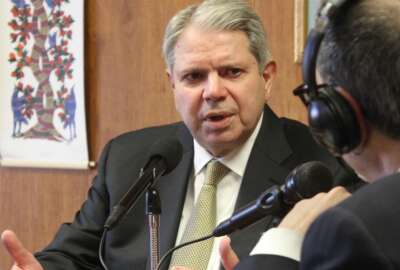Pandemic waste is enough to make a person cry
The government spent trillions of dollars on pandemic relief and no one knows yet how many went out as improper payments.
Best listening experience is on Chrome, Firefox or Safari. Subscribe to Federal Drive’s daily audio interviews on Apple Podcasts or PodcastOne.
Significant shortcomings – that’s the word the Government Accountability Office is using to describe how pandemic relief agencies applied their financial controls. The government spent trillions of dollars and no one knows yet how many went out as improper payments. Now, GAO has a long list of recommendations for Congress. Comptroller General Gene Dodaro joined the Federal Drive with Tom Temin with the rundown.
Interview transcript:
Tom Temin: Mr. Dodaro, good to have you on.
Gene Dodaro: It’s a pleasure to be with you, Tom.
Tom Temin: So this must be a little frustrating for GAO because when we had all of this rush of legislation over a period of 18 months to appropriate this money, there was a PRAC set up to oversee it, agencies promised RAT [Recovery Accountability and Transparency] Board-like structures similar to the 2008 relief. What happened? What do you see as going on here?
Gene Dodaro: Well, there was a tremendous rush and a sense of urgency to deal with the public health issues and the economic repercussions of the pandemic. And as a result, agencies either reduced or eliminated some of the controls that were in place before the payments were made. Then, they could have compensated a little bit by putting in aggressive monitoring practices and post-payment reviews right after the money. But those were slow to put in place as well, Tom. And so I was very concerned, I spoke about this, tried to deal with the agencies. But the trade offs of urgency over transparency and accountability meant that we didn’t meet the transparency and accountability goals that everybody hoped we would meet.
Tom Temin: So are agencies yet to put in those controls, at least to understand what happened or will we ever know the extent of what might have been improper payments, do you think?
Gene Dodaro: Well, they’ve been, quite honestly slow to put the controls in place. The IG’s have been very aggressive in going after people that they’ve identified as fraud. There are hundreds of people that have already pled guilty and convicted, there’s federal charges pending against hundreds of others. It’ll be very difficult to know what the full extent of the fraud will be over a period of time. But the main message that I had to the Congress was that these problems I just explained to you about the trade offs were exacerbated by underlying financial management weaknesses that were in place before the pandemic. This included a significant payment problem with improper payments. Even in 2001, there was $281 billion in improper payments, 86 programs, 16 different agencies, one-third of those programs (26) had over 10% error rate. So we had a payment problem before. Secondly, agencies were supposed to implement 2016 legislation to implement GAO best practices for preventing fraud before it occurred. But they were slow to put these in place. So SBA and Department of Labor weren’t really as ready as they should have been to prevent fraud before the pandemic emergency.
Tom Temin: So to make an analogy, it’s almost as if they had weak knees to begin with, and then when hiking with a 200-pound backpack.
Gene Dodaro: That’s a fair analogy, Tom, that’s a fair analogy. And I was also concerned, you mentioned the RAT Board. The way the PRAC was set up initially in 2020, they didn’t have all the support that the RAT Board had at the beginning of the Recovery Act. Now the Congress compensated for that in March 2021, with the American Rescue Plan, but that was a year after trillions had been already authorized. And the programs were well underway. One of the recommendations I made to the Congress is to make this, what’s now called the PACE [Program of All-Inclusive Care] center – it’s kind of like the recovery operation center, but only focuses on pandemic money – is to make this IG analytical capability permanent, and to have it apply to all federal spending. I made this recommendation back in 2015. So that recovery operations center wouldn’t cease operations. But unfortunately, that recommendation was not heated. So I’m adding it again. And hopefully, we’ll get this in place.
Tom Temin: We’re speaking with Gene Dodaro, he is comptroller general of the United States and head of the Government Accountability Office. And one of them, as you mentioned, fraud risk management reporting, your recommendation is to reinstate a requirement that fraud controls are reported annually. I guess, in a sense, you’re kind of chiding Congress for letting this lapse in the first place.
Gene Dodaro: Well, when the Data Analytics and Fraud Reduction Act got folded into broader improper payments legislation, and this was an oversight I believe, I’m asking them to correct that and have more visibility and reporting. I’m also recommending, Tom, that improper payments, be reported in the annual financial reports of the government. And OMB eliminated that requirement a while back and only has it in PaymentAccuracy.gov, which is okay, that’s fine. But I believe that it also should be in the financial reports of the government, which is really a record of the stewardship over federal funds, which includes what payments were proper or not. Also calling for a greater role for the CFOs. And making sure that proper payment estimates are proper, that there’s monitoring of corrective actions. Right now, it’s just the program officials that run the program. So we need a little more rigor and more oversight within the executive branch agencies. I’m also suggesting any new program that’s created by the Congress, over $100 million, be automatically determined to be susceptible to improper payments. So you’d have to prove that a program is low risk, not wait, as now as the case two or three years down the road, when there’s problems already entrenched. And right now, they don’t have to estimate until that time frame. So this would put a better safe guard in up front. You really got to get ahead of these issues. That’s why I also recommended that the Congress require OMB to institute internal control plans for emergency spendings now, to have it in place. So it’s ready to go if an emergency hits. You can always tailor it a little bit, but we know what the problems are. Well, we’re not ready. And you got to get ahead of this stuff.
Tom Temin: Sure, yes, there will be other situations, in other words, when the government is appropriating wholesale, but distributing money retail, and you have this huge distribution of amounts that just very hard to trace.
Gene Dodaro: That’s exactly right. I mean, we first made this recommendation as it related to natural disaster systems, Tom. But that wasn’t put in place. And we made this so it’d be extended to all emergency spending. And so we’re reiterating that kind of recommendation now as well. We know we’re gonna have additional emergencies in the future, we know that there’ll be pressure to put out money quickly. But there should be some prevention of fraud efforts underway, quick risk assessments that are done before payments start flowing freely, so that there are some controls up front, and then there ought to be quick post-payment reviews, so you can get some recoveries underway. Experienced will tell you, if you don’t get on top of this stuff, later your ability to recover anything gets severely diminished.
Tom Temin: And just getting back to the detail of chief financial officers. I mean, they have been statutorily in place now for 30 some years, and it seems like they’re really still not fully inculcated into all agency activities. I would think a program manager that just been handed $500 billion or a $1 trillion wouldn’t leave his or her office without first calling the CFO.
Gene Dodaro: Well, I agree, Tom. We did a 30-year study of the benefits of the CFO, and there were many. We’ve got better leadership in place, there have been a lot of improvements and financial management agencies. Now, most of them routinely get clean audit opinions. But the CFOs, as you’re pointing out, don’t all have uniform responsibilities. And some don’t have responsibility for budget formulation, for example. So we’ve recommended to the Congress, that they give CFOs uniform responsibilities across government. They give the deputy CFOs similar responsibility so they could step in when there’s inevitable turnover, to require better financial systems plans be put in place, better reporting on cost and performance. The Senate passed the bill with the suggestions last Congress and the House just reintroduced that bill. So I’m hoping that the Senate will take it up as well. And put also in there these additional legislative suggestions that we’re making to have a better stronger financial foundation. I was also at this point in time that the, some agencies, particularly SBAwhere we ran into problems very early in the pandemic, wouldn’t take advice that I offered. During the Recovery Act, we worked hand in glove with the Treasury Department on the Troubled Asset Relief Program. The government got back more money actually thea we gave the banks and we didn’t get everything back in terms of the automakers and of course, there were housing programs that were never intended to be repaid. And they got a clean audit opinion the first year. And I made same offer for SBA and was rebuffed. And as a result, they got off to a poor start and, quite honestly, they’re overwhelmed. But in that case, you should be asking for help. And when people are offering it, you should be taking them up on the opportunity. So I think there’s also advice to Congress to make sure in future emergencies, it’s clear that the agencies should reach out, not only to the CFO, Tom, but to the IG community, because they have a lot of experience, and GAO, in these matters, and can be a constructive force in the beginning of the programs, not just the after-the-fact audit.
Tom Temin: And it seems like there’s one other missing piece here and that is good financial controls need to manifest themselves in the application process and back end processes for accepting applications and deciding and distributing money in the programming of the program, if you will.
Gene Dodaro: Right. Yeah and we’re working with OMB and Treasury now, OPM, to see if we can come up with better identity verification issues up front. In some of these programs, particularly the Unemployment Insurance Program gets administered through the states so that the states are on the front line. So it’s not just the federal agencies, Tom, we got to get the states more modern systems, better controls up front and a lot of the improper payments also occur in the Medicaid program, which is state-administered program as well. So this is a governmental issue that requires federal and state cooperation, but the federal government needs to lead. And that’s what I’m trying to advocate.
Tom Temin: Alright, any reaction so far? Are you getting vibes from the Hill that yeah, we need to do this?
Gene Dodaro: Oh, absolutely. I was very pleased that the Senate called the hearing on March 17, before a Senate Committee on Homeland Security and Governmental Affairs. I’ve had conversations with the House leadership. So I think there’s a recognition that this situation with pandemic aid didn’t turn out as well as people expected from preventing fraud and ensuring proper payments and efficiencies. There were a lot of good things that happened, but in that aspect, I don’t think anybody was fully satisfied. And they’re preparing to deal with this and hopefully implement all the suggestions that we in the IG community have made.
Tom Temin: Gene Dodaro is comptroller general of the United States and head of the Government Accountability Office. As always, thanks so much for joining me.
Gene Dodaro: It’s always a pleasure, Tom, you take care.
Copyright © 2025 Federal News Network. All rights reserved. This website is not intended for users located within the European Economic Area.
Tom Temin is host of the Federal Drive and has been providing insight on federal technology and management issues for more than 30 years.
Follow @tteminWFED






